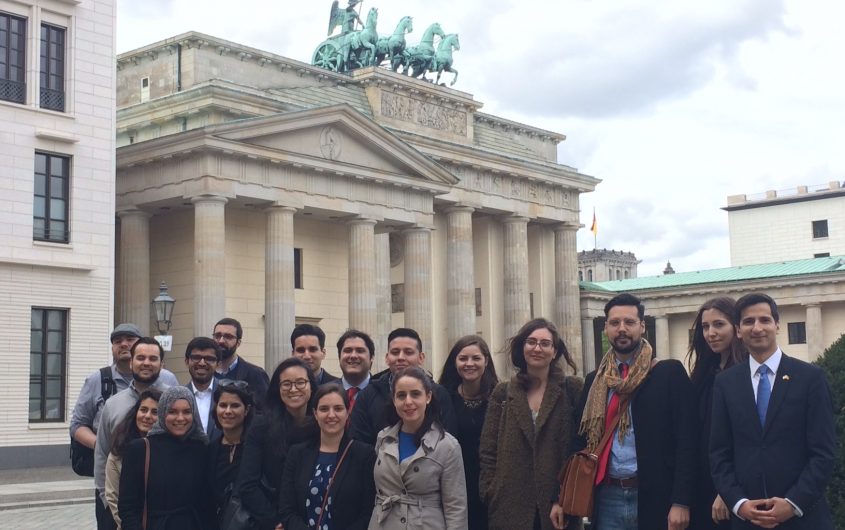
AICGS
How a Public Relations Framework Can Help Us Rethink Transatlanticism

Enes Mert
Edelman
Enes Mert is an Assistant Account Executive at the global communications firm Edelman where he works with the crisis communication and corporate reputation team in the Berlin office. He has received his master’s degree from the University of Edinburgh in International Relations in 2018. Mr Mert holds a bachelor’s degree in Political Science from Free University Berlin and the University of Warwick in Great Britain, where he specialized in foreign policy analysis with a focus on the EU’s foreign policy.
As a German with a Turkish migration background, Mr Mert is strongly engaged in issues dealing with immigration, diversity and civil society in Germany. He was a volunteer at InteGREATer e.V. where he gave regular talks to young students with an immigration background to raise awareness for education. Mr Mert gained work experience as an intern in the German Bundestag, spent two months as an assistant to the chair of the faculty for International Relations at the Middle Eastern Technical University in Ankara, and interned with the communication consultancy WMP Eurocom in Berlin. In 2015, he was a participant at the School of Democracy in Italy, a forum for young leaders organized by the S&D Faction in the European Parliament. Recently, he took part in the 2017-2018 AICGS Transatlantic Exchange Program for Young Minorities in Washington, DC, and Berlin.
He is a 2018-2019 participant in AICGS’ project “A German-American Dialogue of the Next Generation: Global Responsibility, Joint Engagement,” sponsored by the Transatlantik-Programm der Bundesrepublik Deutschland aus Mitteln des European Recovery Program (ERP) des Bundesministeriums für Wirtschaft und Energie (BMWi).
PR is often discounted as salesmanship or deception. But PR at its essence is about explaining something—an idea, a product, or a policy—in compelling terms. Drafting a public relations strategy is a holistic and analytical process. It reveals the strengths and weaknesses of an organization—as well as its opportunities. It identifies target groups, and how to effectively communicate with specific audiences to create positive messages that boost image. Applying PR-inspired thinking to a review of transatlantic relations reveals why transatlanticism needs a paradigm shift and must reach new audiences.
Situational Analysis: Know Yourself and Your Position
The transatlantic partnership’s strengths are the democratic foundation of their societies. The rule of law and respect for individual liberties are a compass in times of rising authoritarianism. The weaknesses are, however, its diminished credibility and elitist image. For too long, transatlanticists have relied on the endurance of Western rules and norms. But the world operates differently today. The liberal order lacks the coherent narrative that existed during the Cold War and must find a compelling and coherent story. The transatlantic community will further need to acknowledge multiple modernities and legitimate interests of other international actors. As the U.S. National Security Strategy 2010 rightly observed: “To succeed, we must face the world as it is.”
On the other side, the crisis is homemade. A country takes its foreign policy strength from the strength of its interior. The social purpose of liberal democracies is being undermined and increasing distrust toward elites are fragmenting our societies. An anti-liberal authoritarian populism runs across Western societies triggered by worsening socio-economic developments in the West. At this point, we should remind ourselves that it was the prosperity promise of capitalism that helped democracies to flourish. If the beneficiaries of this prosperity promise are getting less and less, it will lead to distrust in the idea of liberal democracy.
Communication: Reach Out to (New) Target Groups
While the crisis comes from within, that is where the biggest opportunity lies as we entrust transatlantic relations in the hands of a new generation. The collective memories of the Cold War, events that have moved the societies closer together, are becoming more diffuse. Tomorrow’s policymakers’ views on foreign policy will differ, including the sensitivity attached to the transatlantic partnership. While one should remain cautious about what to ascribe to a generation, a recent Pew Research poll suggests shifting patterns of foreign policy priorities: Strengthening the UN, dealing with global climate change, and promoting human rights have the highest approval rates among young Americans aged between 18-29. These are policy issues that require transatlantic cooperation, and more importantly, they debilitate the idea that global cooperation is antithetical to national sovereignty as propagated by authoritarian populists. To create enthusiasm for transatlantic engagement, transatlanticists will need to prioritize policies that resonate with a changing consciousness of the coming generations.
The driving actors in the transatlantic community must also reach out to a variety of social groups, especially to those with less social capital as they lack transnational experience and have little commitment to transatlantic relations. The good news is: Despite varying degrees of political participation, the decisive advantage Western democracies have vis-à-vis authoritarian systems is the open civil society—and the potential to create multipliers across societies.
To convince new groups, however, an emotional message must precede it: You have a voice. That is the essence of PR, because it activates audiences. The transatlantic dialogue requires more multidisciplinary voices and ideas, such as from climate scientists, urbanists, or even futurologists. Most importantly, broader policy diversity bears crucial counter-intuitive messages for people who only think of transatlantic relations as the annual gathering of elites at the Munich Security Conference. And that needs to be addressed.








